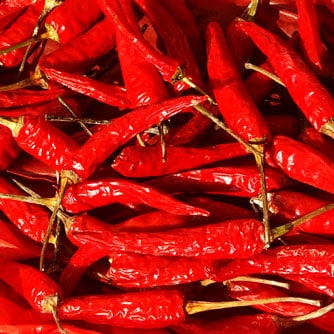While capsaicin has been studied for potential benefits in fighting obesity, the underlying molecular mechanism by which the chili pepper compound has been observed to decrease calorie intake, shrink fat tissue, and lower fat levels in the blood has not been elucidated. Jong Won Yun, from Daegu University (Korea), and colleagues engaged an animal model of obesity, and fed high-fat diets with or without capsaicin to the study animals. The team observed that the capsaicin-treated rats lost 8% of their body weight and showed changes in levels of at least 20 key proteins found in fat, whereby the altered proteins worked to break down fats. Writing that: “These data demonstrate that thermogenesis and lipid metabolism related proteins were markedly altered upon capsaicin treatment in [white adipose tissue],”the researchers urge that: “capsaicin may be a useful phytochemical for attenuation of obesity.”
Chili Pepper Compound Helps to Fight Fat
Jeong In Joo, Dong Hyun Kim, Jung-Won Choi, Jong Won Yun. “Proteomic Analysis for Antiobesity Potential of Capsaicin on White Adipose Tissue in Rats Fed with a High Fat Diet.” J. Proteome Res., 2010, 9 (6), pp 2977–2987, April 1, 2010.
RELATED ARTICLES




